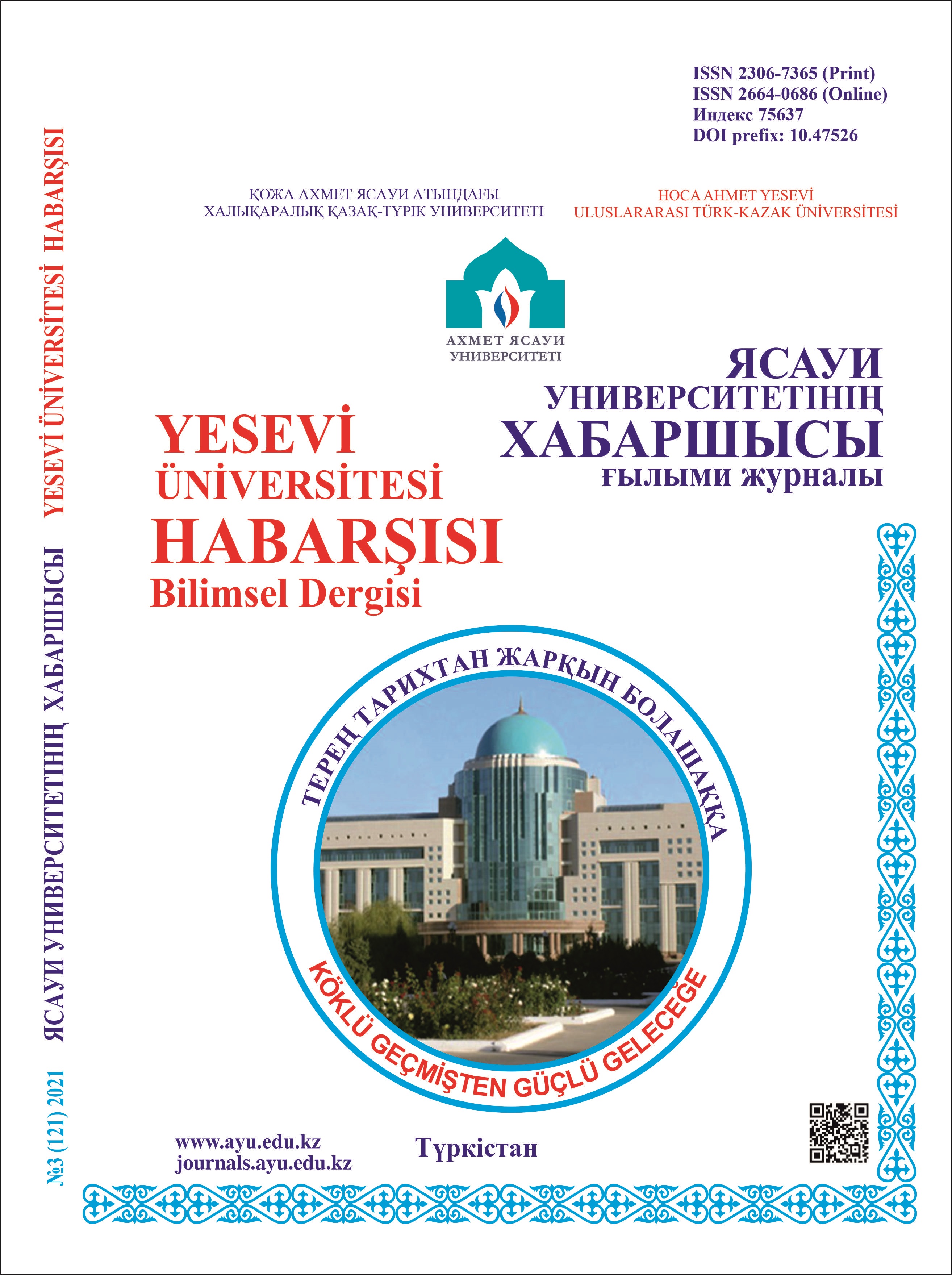ТІЛДІК БІРЛІКТЕРДІҢ ЭМОТИВТІЛІГІ ЖӘНЕ ЭМОТИВТІ ВАЛЕНТТІЛІГІ
372 326
Кілт сөздер:
эмотивтілік, эмотивті валенттілік, эмотив, лексика, семантикаАңдатпа
Қазіргі лингвистикада эмотивті лексика қызметінің ұлттық-мәдени мазмұнын зерттеуге назар қойылуда. Тіл бірліктерінің семантикалық сипатын түсінуде бұл ерекше маңызды. Дегенмен мұндай лексикалық бірліктерді тіркесімдік қабілеті мен оның синктаксистік қызметі тұрғысынан қарастыру көп нәтижеге қол жеткізуге мүмкіндік береді. Сондықтан бұл мақалада эмотивті бірліктер лексикология, семасиология және коммуникативтік лингвистика аспектісінде зерделенген. Мақаланың мақсаты эмотивті сөздердің валенттілігін зерттей отырып, оны лингвистикалық негіздеу және коммуникативтік мәнін ашу болып табылады. Эмотивті тіркесімдегі тілдік бірліктер өзге бірліктермен байланысқа түсу арқылы өзінің эмотивті қызметін жүзеге асыруға қабілетті болатыны көрсетілген. Бұл эмотивті валенттілікте сөйлеудегі тілдік бірліктердің эмоционалды-экспрессивті және экспрессивті-стилистикалық үйлесім заңдылығы туралы идеяны одан әрі дамыта түсетіні белгілі. Мақалада авторлар сөздің эмотивті валенттілігінің құрылымдық және функционалдық аспектілерін қарастыра отырып, эмотивті валенттілікті зерттеу тәсілдеріне тоқталған. Соның ішінде сөздің эмотивті валенттілік типтері мен валенттілік қабілетінің ашылу механизмдері талданған. Зерттеу нысаны – сөз семантикасының эмотивті компоненттері. Дереккөз ретінде негізгі талдау материалдары қазақ тілінің ұлттық корпусынан, сондай-ақ көркем әдебиеттерден алынды. Зерттеу барысында дербес сөздің контексте немесе сөзбен тіркесу арқылы эмотивке айналатыны дәйектелді. Эмотивтіліктің негізгі бір тәсілі валенттілік болып табылатыны туралы ғылыми тұжырым қазақ тіл білімінде бұрын тиісінше талдауға алынып, зерттеулерде берілмеген. Сөздің валенттілігін зерттеу бағытында теориялық және практикалық жұмыстардың аздығы осы тақырыптың өзектілігі мен эмотивті валенттіліктің зерттелу қажеттілігін көрсетеді. Жұмыс барысында кез келген сөздің эмотивтілігі динамикалы екендігі, яғни лексикалық бірліктердің өзекті, әлеуетті жағдайға сай пайда болатын эмоционалды-мағыналық көпваленттілігі жөнінде болжам жасалды.
Әдебиеттер тізімі
ПАЙДАЛАНЫЛҒАН ӘДЕБИЕТТЕР ТІЗІМІ
Ларина Т.В. Прагматика эмоций в межкультурном контексте // Вестник Российского университета дружбы народов. Серия: Лингвистика. – 2015. – №1. – С. 144–163.
Қазақ тілінің ұлттық корпусы. [Электронды ресурс]. URL: https://qazcorpora.kz/ (Қаралған күні: 30.08.2022)
Қазақша түсіндірме сөздік. [Электронды ресурс]. URL: https://sozdikqor.kz/ (Қаралған күні: 28.08.2022)
Шаховский В.И. Особенности мужской и женской речи в русском языке в аспекте лингвистической теории эмоций. – Волгоград: Перемена, 1982. – С. 82–89.
Шаховский В.И. Лингвистическая теория эмоций: Монография. – Гнозис, 2008. – 117 c.
Кацнельсон С.Д. Общее и типологическое языкознание. Изд. 2, доп. – М.: Книжный дом «Либроком», 2010. – 344 с.
Теньер Л. Основы структурного синтаксиса. – М.: Прогресс, 1988. – 489 с.
Оразов М. Қазіргі қазақ тіліндегі қалып етістіктері. – Алматы: Мектеп, 1980. – 176 б.
Жұбанов Қ. Қазақ тілі жөніндегі зерттеулер. – Алматы: Ғылым, 1999. – 582 б.
Күркебаев К. Өлең мәтініндегі етістіктердің семантикалық тіркесімділігі // ҚазҰУ хабаршысы Филология сериясы. – 2012. – №1 (135). – Б. 125–131.
Штеба А.А. Структурно-функциональный аспект эмотивных валентностей слова: автореф. ... канд. филол. наук. – Волгоград: Книга, 2012. – 24 с.
Foolen A. Word valence and its effects. In U.M. Lüdtke (Ed.), Emotion in language: Theory – research – application. John Benjamins Publishing Company Ulrike M. Emotion in Language: Theory – research – application, 2015. – P. 241–256.
Шаховский В.И. Эмоции: Долингвистика, лингвистика, лингвокультурология. – М.: Книжный дом «Либроком», 2010. – 128 с.
Шаховский В.И. Значение и эмотивная валентность единиц языка и речи. // Вопросы языкознания. – 1984. – №6. – C. 97–104.
Мамырбекова Г. Қазақ тіліндегі араб, парсы сөздерінің түсіндірме сөздігі. – Алматы: Мемлекеттік тілді дамыту институты, 2017. – 658 б.
Қайыржан К. Сөз сандық. Қазақтың көне сөздері. – Алматы: Өнер, 2013. – 480 б.
Байтұрсынұлы А. Бес томдық шығармалар жинағы. – 3-т. Тіл – құралы. – Алматы: Алаш, 2005. – 352 б.
REFERENCES
Larina T.V. Pragmatika emociy v mejkulturnom kontekste [Pragmatics of emotions in an intercultural context] // Vestnik Rossiyskogo universiteta drujby narodov. Seriia: Lingvistika. – 2015. – №1. – S. 144–163. [in Russian]
Qazaq tіlіnіn ulttyq korpusy. [National Corps of the Kazakh language] [Elektrondy resurs]. URL: https://qazcorpora.kz/ (Qaralgan kunі: 30.08.2022) [in Kazakh]
Qazaqsha tusіndіrme sozdіk [English Explanatory Dictionary]. [Elektrondy resurs]. URL: https://sozdikqor.kz/ (Qaralgan kunі: 28.08.2022] [in Kazakh)
Shahovskiy V.I. Osobennosti mujskoi i jenskoi rechi v russkom iazyke v aspekte lingvisticheskoi teorii emociy [Features of male and female speech in the Russian language in the aspect of the linguistic theory of emotions]. – Volgograd: Peremena, 1982. – S. 82–89. [in Russian]
Shahovskiy V.I. Lingvisticheskaia teoriia emociy: Monografiia [Linguistic theory of emotions. Monograph]. – Gnozis, 2008. – 117 c. [in Russian]
Kacnelson S.D. Obshee i tipologicheskoe iazykoznanie [General and typological linguistics]. Izd. 2, dop. – M.: Knijnyi dom «Librokom», 2010. – 344 s. [in Russian]
Tenier L. Osnovy strukturnogo sintaksisa [Basics of structural syntax]. – M.: Progress, 1988. – 489 s. [in Russian]
Orazov M. Qazіrgі qazaq tіlіndegі qalyp etіstіkterі [Verbs of mold in the modern Kazakh language]. – Almaty: Mektep, 1980. – 176 b. [in Kazakh]
Jubanov Q. Qazaq tіlі jonіndegі zertteuler [Research on the Kazakh language]. – Almaty: Gylym, 1999. – 582 b. [in Kazakh]
Kurkebaev K. Olen matіnіndegі etіstіkterdіn semantikalyq tіrkesіmdіlіgі [Semantic combination of verbs in the text of the poem] // QazUU habarshysy Filologiia seriiasy. – 2012. – №1 (135). – B. 125–131. [in Kazakh]
Shteba A.A. Strukturno-funkcionalnyi aspekt emotivnyh valentnostei slova: avtoref. ... kand. filol-h. Nauk [Structural and functional aspect of emotive valences of the word: abstract ... Candidate of Philology. Sciences']. – Volgograd: Kniga, 2012. – 24 s. [in Russian]
Foolen A. Word valence and its effects. In U.M. Lüdtke (Ed.), Emotion in language: Theory – research – application. John Benjamins Publishing Company Ulrike M. Emotion in Language: Theory – research – application, 2015. – P. 241–256.
Shahovskiy V.I. Emocii: Dolingvistika, lingvistika, lingvokulturologiia [Emotions: Pre-linguistics, linguistics, linguo culturology]. – M.: Knijnyi dom «Librokom», 2010. – 128 s. [in Russian]
Shahovskiy V.I. Znachenie i emotivnaia valentnost edinic iazyka i rechi [Meaning and emotive valence of language and speech units] // Voprosy iazykoznaniia. – 1984. – №6. – C. 97–104. [in Russian]
Mamyrbekova G. Qazaq tіlіndegі arab, parsy sozderіnіn tusіndіrme sozdіgі [Explanatory Dictionary of Arabic and Persian words in the Kazakh language]. – Almaty: Memlekettіk tіldі damytu instituty, 2017. – 658 b. [in Kazakh]
Qaiyrjan K. Soz sandyq. Qazaqtyn kone sozderі [The word box. The ancient Kazakh words]. – Almaty: Oner, 2013. – 480 b. [in Kazakh]
Baitursynuly A. Bes tomdyq shygarmalar jinagy. – 3-t. Tіl – quraly. [Collection of works in five volumes. – 3-t. Language-tool]. – Almaty: Alash, 2005. – 352 b. [in Kazakh]

